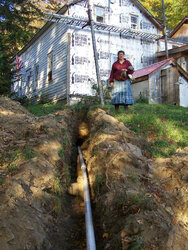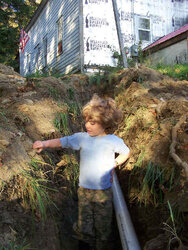Since I don't have a french drain, whenever it rains very heavy, I get water in my basement. Sump pump takes care of the runoff but since the basement isn't flat, I get puddles on the far side of the basement where the pump is NOT at. Right now, I use a small shop vac connected to a garden hose to basically suck the water into the shop vac and through a self-made connecter and a garden hose, drained into my sump pump well.
Problem is, it's a slow process, got to suck the water up into the shop vac and let gravity do the rest.
I looked at a basic AC water pump but most of them have a minimum clearance, i.e. the water has to be over 1" high for it to suck. Now I could probably dig a pit over there and then use it, but it still would be slow because I would think the pump would be a lot faster than gravity and I'd have to deal with not enough input to the pump.
Other than a french drain, is there a cheap pump that can suck water without a clearance. Obviously not interested in a fancy gas powered water pump that does 1000gfm or something!
Jay
Problem is, it's a slow process, got to suck the water up into the shop vac and let gravity do the rest.
I looked at a basic AC water pump but most of them have a minimum clearance, i.e. the water has to be over 1" high for it to suck. Now I could probably dig a pit over there and then use it, but it still would be slow because I would think the pump would be a lot faster than gravity and I'd have to deal with not enough input to the pump.
Other than a french drain, is there a cheap pump that can suck water without a clearance. Obviously not interested in a fancy gas powered water pump that does 1000gfm or something!
Jay




